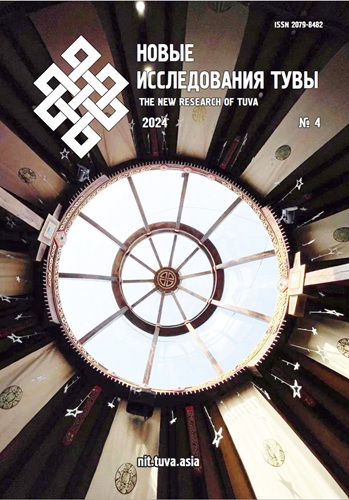Problems of poverty of single-parent families in Tuva
DOI:
https://doi.org/10.25178/nit.2024.4.14Keywords:
Republic of Tuva; single-parent family; poverty; income structure; social transfer; alimony; familial assistance; TuvansAbstract
The article analyzes the issue of poverty among single-parent families in the Republic of Tuva, where their numbers have been increasing in recent years. The study uses data from a sociological investigation conducted by the author in the region in 2023. Through in-depth interviews, 33 mothers heading single-parent families (monoparental households) were surveyed.
It was found that single-parent families are at a higher risk of poverty compared to other family types. The primary source of income for these families is the wage of the mothers who head them. For various reasons, single-parent families often do not receive the full alimony to which they are entitled. Economic difficulties, the need for material and instrumental support from relatives, and the lack of their own housing compel some of these mothers to live with extended family. The role of subsistence farming as an adaptive strategy has diminished in importance. In rural areas facing high unemployment, government benefits have become a regular income source for single-parent families until children reach the age of 17.
The article highlights that while government social transfers aimed at supporting single-parent families help reduce poverty levels within these households, they may also lessen the motivation for economic activity among women.
The conclusion suggests that it would be advisable to classify single-parent families as a distinct group within the regional poverty reduction program. Recommendations are provided for targeted support of single-parent families as part of poverty alleviation measures.
References
Voronin, G. L. (2013) Investments of Russian households in education, health and development of children (according to RLMS-HSE, in 1994–2011). In: Bulletin of the Russian Monitoring of the Economic Situation and Public Health of the Higher School of Economics. Issue 3 / ed. by P. M. Kozyreva. Moscow, NIU VShE Publ. 206 p. Pp. 103–132. (In Russ.).
Voronin, G. L. and Yanak, A. L. (2018) Single‐parent families: their types and social portrait of the lone parent. Woman in Russian Society, no. 1 (86), pp. 53–66. (In Russ.). DOI: https://doi.org/10.21064/WinRS.2018.1.5
Gorina, T. I. (2019) Methodological foundations of the study of the problem of poverty in the Republic of Tuva. Informatsionno-analiticheskii biulleten' Instituta sotsiologii FNISTs RAN, no. 3, pp. 18–28. (In Russ.). DOI: https://doi.org/10.19181/inab.2019.3.2
Ivchenkov, S. G. and Kantemirova, G. A. (2019) Low-Income Single-Parent Family. Empirical Analysis. Izv. Saratov Univ. (N. S.), Ser. Sociology. Politology, vol. 19, issue 3, pp. 256–259. (In Russ.).
Korchagina, I. I. and Prokof'eva, L. M. (2023) Unemployment of parents — one of the poverty causes in families with children. Population, vol. 26, no. 2, pp. 40–51. (In Russ.). DOI: https://doi.org/10.19181/population.2023.26.2.4
Mareeva, S. V. and Slobodeniuk, E. V. (2022) Unequal investing in the human capital of children (The case of Russia). Terra Economicus, vol. 20, no. 3, pp. 98–115. (In Russ.). DOI: https://doi.org/10.18522/2073-6606-2022-20-3-98-115
Natsak, O. D. (2022a) The material self-assessment of the Tuvan families in the context of the poverty studies (based on the materials of sociological research). Living Standards of the Population in the Regions of Russia, vol. 18, no. 1, pp. 120–135. (In Russ.). DOI: https://doi.org/10.19181/lsprr.2022.18.1.10
Natsak, O. D. (2022b) Financial and Economic Strategies of Tuvan Families (on the Materials of Sociological Research). Vlast', vol. 30, no. 1, pp. 180–190. (In Russ.). DOI: https://doi.org/10.31171/vlast.v30i1.8803
Natsak, O. D. (2023) Single-parent families and single-parent practices of women in modern Tuvan society. Abakan, V. M. Torosov Khakass Book Publishing House. 240 p. (In Russ.).
Prokof'eva, L. M. and Korchagina, I. I. (2020) Single parent families in Russia: level of spred and material support. Mezhdunarodnyi zhurnal gumanitarnykh i estestvennykh nauk, no. 9–1 (48), pp. 172–179. (In Russ.).
Rzhanitskaia, L. S. and Rybal'chenko, S. I. (2021) Improving the situation of children in divorced families — the way to reduce poverty in Russia. Population, vol. 24, no. 1, pp. 24–32. (In Russ.).
Rzhanitsyna, L. S. (2010) Child support as an element of civil responsibility. Sotsiologicheskie issledovaniia, no. 37 (315), pp. 56–65. (In Russ.).
Rostovskaia, T. K., Khasbulatova, O. A. and Smirnova, I. N. (2022) Social portrait of single mothers in Russian society: conceptual approaches. Woman in Russian Society, no. 4, pp. 15–21. (In Russ.). DOI: https://doi.org/10.21064/WinRS.2022.4.2
Rostovskaia, T. K., Khasbulatova, O. A. and Smirnova, I. N. (2023) Single mothers in Russian society: strokes to a social portrait. Woman in Russian Society, no. 1, pp. 32–42. (In Russ.). DOI: https://doi.org/10.21064/WinRS.2023.1.3
Samba, A. D.-B., Goliusova, Iu. V., Demidov, A. A., Anan'eva, K. E. and Ondar, N. D. (2024) Sociological portrait of the single-parent family in the Republic of Tuva. New Research of Tuva, no. 1, pp. 184–196. (In Russ.). DOI: https://doi.org/10.25178/nit.2024.1.12
Selivanova, O. V. and Korobkova, N. Yu. (2004) u. Single-parent families in Russian regions: scale and socio-economic characteristics. Social and labor research, no. 54 (1), pp. 147–156. (In Russ.). DOI: https://doi.org/10.34022/2658-3712-2024-54-1-147-156
Socio-stratification processes in the Republic of Tuva (2020) / Z. T. Golenkova et al., ed. by Z. T. Golenkova et al. Moscow, Kyzyl, FNISTs RAN. 128 p. (In Russ.). DOI: https://doi.org/10.19181/monogr.978-5-89697-332-4.2020
Churilova, E. V. (2015) The composition and welfare of single-parent families in Russia. Sotsiologicheskie issledovaniia, no. 3, pp. 78–81. (In Russ.).
Lokshin, M. M., Harris, K. M. and Popkin, B. M. (2020) Single Mothers in Russia: Strategies for Coping with Poverty. World Development, vol. 28, issue 12, pp. 2183–2198. DOI: https://doi.org/10.1016/S0305-750X(00)00070-X
Maleeva, V., Joxhe, M. and Zanaj, S. (2020) Poverty in Russia: The Role of the Marital Status and Gender. CREA / Department of Economics and Management Discussion Paper, Series 2020–16. Center for Research in Economic Analysis, University of Luxembourg. 39 p.
Published
How to Cite
For citation:
Natsak O. D. Problems of poverty of single-parent families in Tuva. New Research of Tuva, 2024, no. 4, pp. 204-220. (In Russ.). DOI: https://doi.org/10.25178/nit.2024.4.14
Issue
Section

This work is licensed under a Creative Commons Attribution-NonCommercial 4.0 International License.

Author(s) license holder(s) grant rights for their work to the journal (grantee of a license) under the simple non-exclusive open license in accordance with Art. 1286.1 «Open license for a research work, work of literature or fine arts», Civil Code of the Russian Federation.
New Research of Tuva publishes articles under the Creative Commons Attribution-NonCommercial license (CC BY-NC).
Since it is an open license, author(s) reserve the right to upload the article to their institutional repository, submit it to another journal (if it allows republications), or republish it on their own website (in full, or in part).
However, several conditions apply here:
a) The republished version must always contain the name(s) and affiliation(s) of the author(s), the original title and the hyperlink to the original version on the New Research of Tuva website;
b) It must be in open access, free of charge, and no category of readers must be in any way whatsoever advantaged over general readership.
c) should the contribution be submitted elsewhere by its author(s) without substantial modification (30% or more of original text unchanged), the body of the article should contain a disclaimer that the original version was published in New Research of Tuva (with a link to the respective page)
The CC-BY-NC is a non-revocable license which applies worldwide and lasts for the duration of the work’s copyright.









